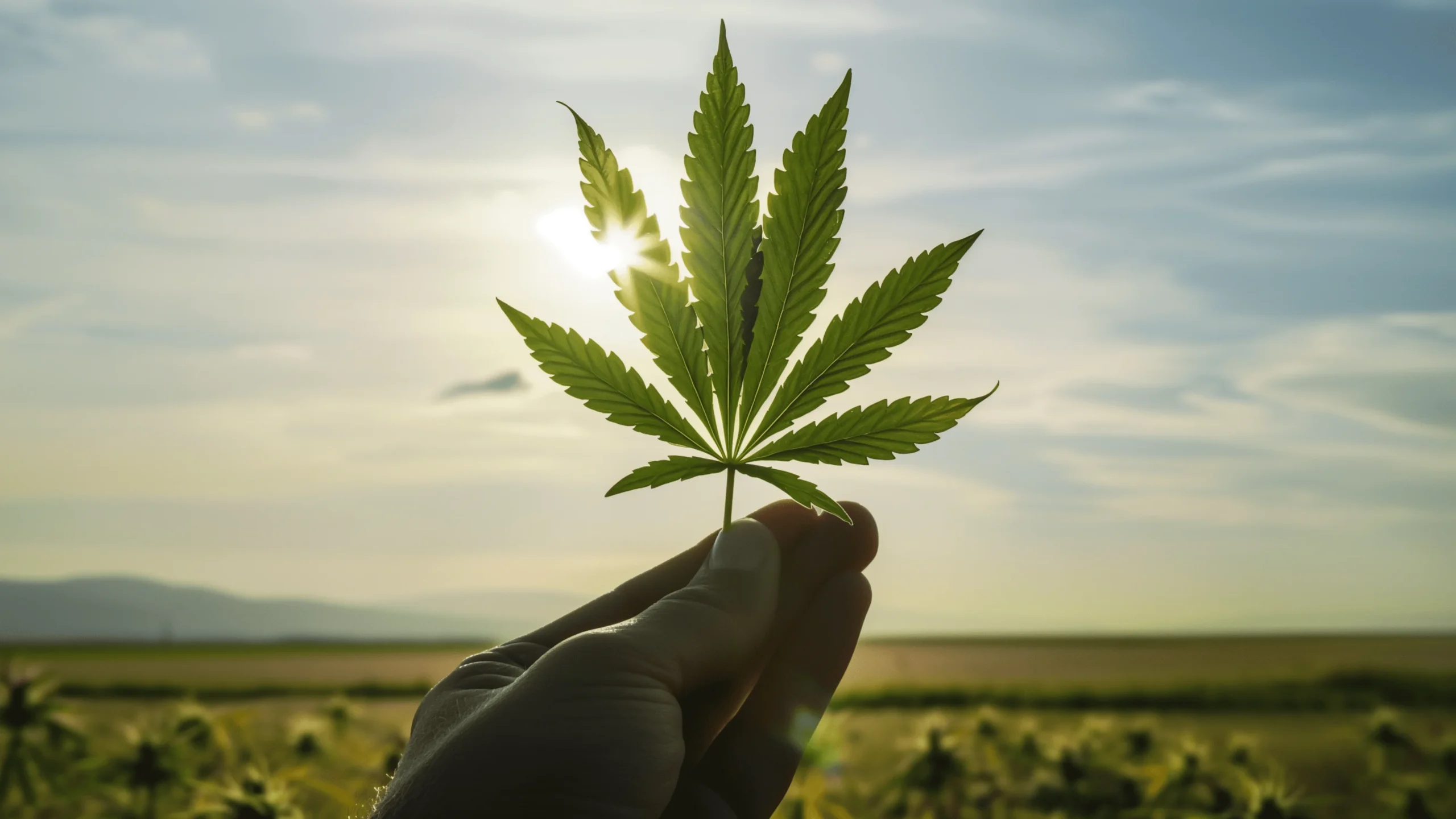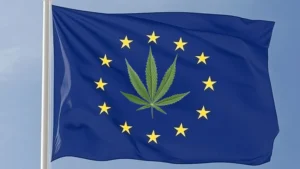Sustainable CBD production involves eco-friendly practices throughout the entire production process, from cultivation to distribution, ensuring minimal environmental impact and high product quality. This includes organic farming, eco-friendly extraction, energy efficiency, sustainable packaging and efficient distribution. At Hempo Solutions, our commitment to sustainable CBD production is at the core of our business philosophy. We believe that producing high-quality CBD products goes hand in hand with encouraging an industry that prioritizes sustainability.
As leading manufacturers in the European CBD market, we aim to set a standard for others to follow through sustainable CBD production. Our journey towards sustainable CBD production involves implementing eco-friendly practices at every stage of the production process, from cultivation to distribution. By choosing organic farming methods, reducing our carbon footprint, and ensuring fair labor practices, we aim to create a positive impact on both the environment and the community.
Sustainable CBD production and farming practices (2025)
We prioritize sustainable CBD production by selecting farms that practice organic and pesticide-free cultivation methods. We source our hemp from EU-approved farms that focus on maintaining the health of the soil and ecosystem. These farms avoid the use of fertilizers and pesticides, ensuring the purity and safety of our CBD products. By minimizing our environmental footprint, we also protect the planet we all share.
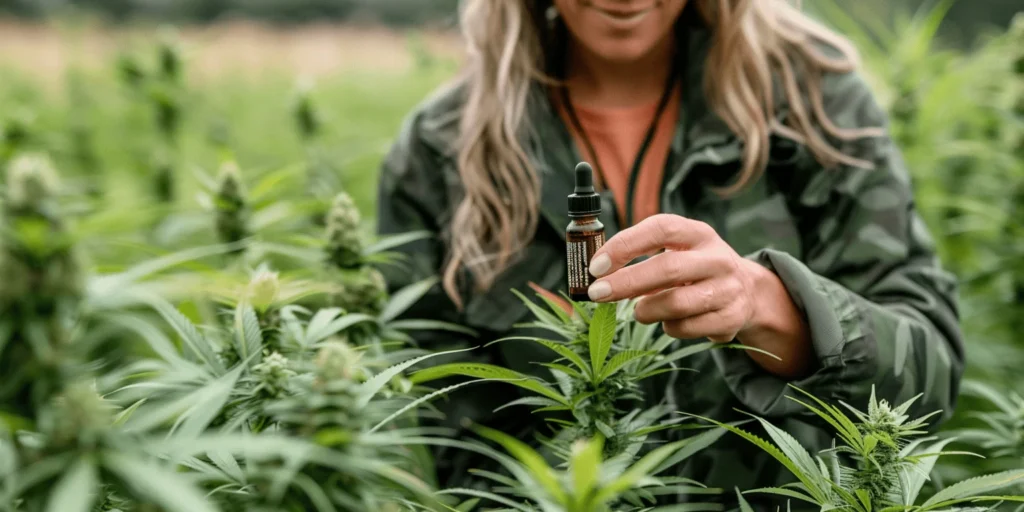
We believe that sustainable CBD production involves a commitment to eco-friendly practices that not only benefit the environment but also enhance the quality of our products. Organic farming methods help preserve biodiversity, improve soil health, and reduce water pollution. By choosing sustainable CBD production, we can provide our clients with high-quality and safe CBD products.
Organic hemp cultivation
Achieving organic certification is a critical component of sustainable CBD production. For CBD to be certified organic, it must be extracted from a certified organic hemp plant, handled in a compliant manner, and processed in a certified organic facility.
At Hempo Solutions, we ensure that our CBD extraction process meets organic hemp cultivation requirements. To label a final CBD product as organic, the extraction must be conducted by a certified organic operation. This strict certification process ensures that our sustainable CBD production maintains the highest standards of purity and environmental responsibility.
By adhering to these standards, we provide our clients with private label CBD products and white label CBD products they can trust by 100%, knowing they are produced sustainably and organically.
Benefits of organic hemp farming
These are the benefits of organic hemp farming in sustainable CBD production:
| It ensures the purity and safety of the hemp; |
| It significantly promotes soil health, e.g. fertility and structure, leading to healthier and stronger hemp crops; |
| It also promotes biodiversity by providing a habitat for various plant and animal species, fostering a rich and balanced ecosystem; |
| It is known for abstaining from synthetic chemicals; |
In short, sustainable CBD production through organic hemp farming methods contributes to environmental conservation and helps to deliver high-quality CBD products that clients can trust.
Certification and standards
At Hempo Solutions, ensuring compliance with organic farming standards in the EU is a top priority. Achieving and maintaining these certifications involves following guidelines that govern every aspect of hemp cultivation and CBD production. This includes using approved organic farming methods, avoiding synthetic pesticides and fertilizers, and ensuring that all processing facilities meet organic standards. By following these guidelines, we can produce CBD products that are not only safe and effective but also environmentally responsible.
Certification processes also require regular audits and continuous improvements to meet evolving standards. Sustainable CBD production at Hempo Solutions means more than just producing high-quality products – it also means valuing the highest standards of environmental and responsibility.
Regenerative agriculture
Regenerative agriculture is an innovative farming approach that significantly enhances sustainable CBD production by focusing on restoring and improving soil health and the surrounding ecosystem. Embracing regenerative agriculture in sustainable CBD production not only ensures high-quality CBD products but also supports long-term ecological balance and sustainability.
In the field of agricultural technology, 2025 is expected to witness the integration of advanced technologies such as artificial intelligence (AI) and digital twins in regenerative agriculture. These innovations will drive insights from datasets, allowing farmers, agronomists, and researchers to optimize productivity and sustainability.
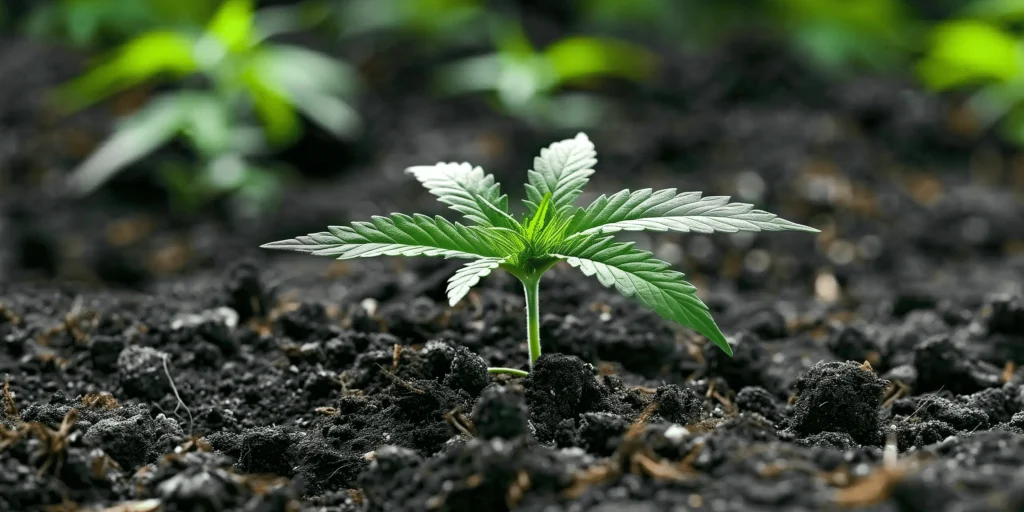
Soil regeneration techniques
Regenerative agriculture utilizes various techniques such as crop rotation, cover cropping, and no-till farming to enhance soil fertility, structure, and biodiversity.
Crop rotation and cover cropping help maintain essential soil nutrients and prevent erosion, while no-till farming minimizes soil disturbance, preserving the natural composition of the soil.
Additionally, regenerative agriculture promotes carbon sequestration, which involves capturing and storing carbon dioxide in the soil, thereby reducing the overall carbon footprint of hemp cultivation.
Eco-friendly CBD extraction and processing
Eco-friendly CBD extraction and processing are essential components of sustainable CBD production. Traditional extraction methods often involve the use of harmful chemicals like butane and hexane, which can damage the ecosystem and pose significant health risks to humans. These solvents can contaminate air, soil, and water, causing long-term environmental damage. Additionally, these CBD extraction methods are more energy-intensive and have a higher carbon footprint.
In contrast, eco-friendly CBD extraction methods, such as CO2 and ethanol extraction, offer a safer and more sustainable alternative. By using CBD double extraction, we can significantly reduce our ecological footprint, enhance the safety and quality of our CBD products, and support the broader goal of sustainable CBD production.
Green CBD extraction methods
CO2 extraction uses pressurized carbon dioxide to extract CBD, ensuring a clean and efficient process without harmful residues. This method leverages CO2’s unique properties at high pressures and low temperatures to act both as a gas and a liquid. This enables the precise targeting of cannabinoids and terpenes. CO2 extraction has a minimal environmental footprint, making it a leading green method in sustainable CBD production.
Ethanol extraction, which uses food-grade ethanol, is another sustainable method that maintains the purity of the CBD while minimizing environmental impact. The process involves soaking the hemp plant in ethanol, which dissolves the desired compounds. The solution is then filtered and evaporated to remove the ethanol, leaving behind pure CBD extract.
Why we choose CO2 extraction
We choose CO2 extraction for several compelling reasons, aligning with our commitment to sustainable CBD production.
One of the primary reasons for choosing CO2 extraction is its ability to produce pure and potent CBD without the use of harmful solvents. CO2 extraction ensures leaving no residual chemicals in the final CBD product.
Another significant advantage of CO2 extraction is its eco-friendliness. The CO2 used in the process can be recycled and reused, minimizing waste and reducing the overall carbon footprint.
Furthermore, CO2 extraction allows for precise control over the CBD extraction process, enabling the extraction of specific cannabinoids and terpenes. This precision results in a high-quality full-spectrum CBD oil that retains the beneficial compounds of the hemp, enhancing the “Entourage effect”.
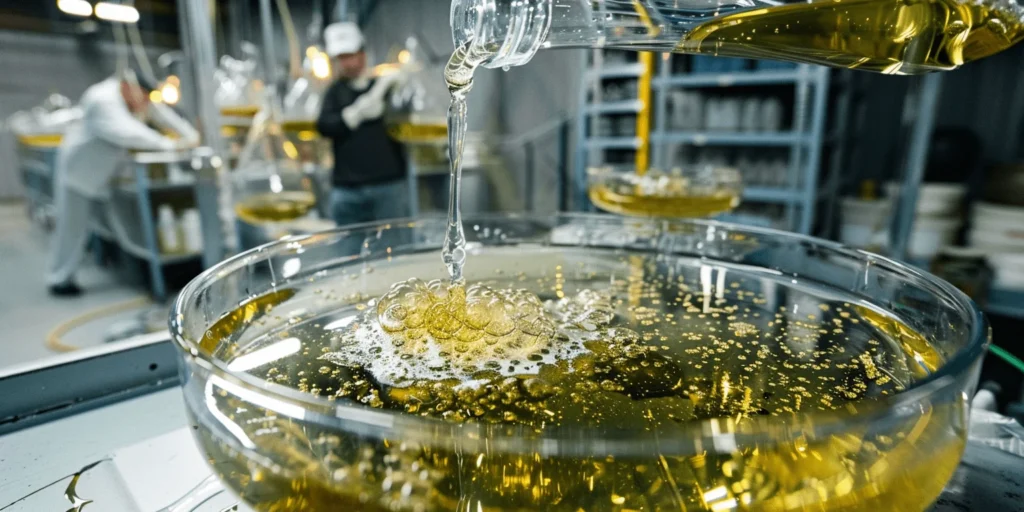
Energy efficiency in processing
Energy efficiency in processing is a crucial aspect of sustainable CBD production, focusing on minimizing energy consumption and reducing the environmental impact of manufacturing operations.
At Hempo Solutions, we prioritize the implementation of renewable energy sources such as solar and wind power to run our processing facilities. This approach significantly cuts down on greenhouse gas emissions, contributing to a cleaner and more sustainable environment.
Additionally, investing in energy-efficient equipment and optimizing production processes leads to substantial energy savings. These practices not only lower the carbon footprint of CBD manufacturing but also reduce operational costs. By prioritizing energy efficiency, CBD producers can align with consumer demand for eco-friendly products and demonstrate a commitment to environmental stewardship.
Renewable energy sources
Our processing plants are equipped with solar panels that harness sunlight, converting it into clean electricity to run our operations. Additionally, we utilize wind turbines to generate further renewable energy, reducing our reliance on fossil fuels.
Alongside these renewable energy sources, we incorporate energy-efficient equipment and processes to maximize our sustainability efforts. This includes advanced HVAC systems, LED lighting, and high-efficiency extraction machinery designed to minimize energy consumption.
By integrating these technologies and using solar and wind power, we significantly reduce our carbon footprint, meeting the growing consumer demand for sustainable CBD products.
Sustainable CBD product packaging and distribution
Sustainable packaging and distribution are vital components of sustainable CBD production, addressing both environmental impact and consumer demand for greener products.
We utilize eco-friendly packaging options such as biodegradable plastics, recyclable materials, and glass, significantly reducing waste and environmental degradation. Our minimalist packaging designs further contribute to sustainability by using fewer materials and reducing overall waste.
On the distribution side, we optimize transportation routes and partner with eco-friendly logistics providers to lower carbon emissions.
Eco-friendly packaging materials
Eco-friendly packaging materials are a foundation of our commitment to sustainable CBD production.
Biodegradable plastics, made from renewable resources such as corn starch, break down more quickly than traditional plastics, minimizing their presence in landfills and reducing pollution.
Recyclable materials, including cardboard and certain types of plastics, are also extensively used in our packaging. By ensuring that these materials can be easily recycled, we contribute to a circular economy where resources are reused, reducing the need for virgin materials and lowering our overall environmental footprint.
Glass is another vital component of our sustainable packaging strategy. It is not only infinitely recyclable but also preserves the integrity and quality of our CBD products, preventing chemical leaching that can occur with some plastics.
Biodegradable and recyclable options
Biodegradable plastics that we use decompose through natural processes, leaving no harmful residues behind, thus ensuring an eco-friendly lifecycle.
This reduces the accumulation of plastic waste in landfills and oceans, supporting a cleaner environment. Our biodegradable plastics ensure that the lifecycle of our packaging is as eco-friendly as possible, aligning with our broader goals of sustainable CBD production.
Minimalist packaging designs
Our minimalist packaging designs aim to use fewer materials overall, reducing waste from the outset. This approach involves careful consideration of packaging dimensions and materials, ensuring that every component serves a purpose without excess.
Smaller, lighter packages consume less space during transportation, leading to lower carbon emissions. This efficiency not only benefits the environment but also reduces shipping costs, creating a win-win scenario for both sustainability and business operations.
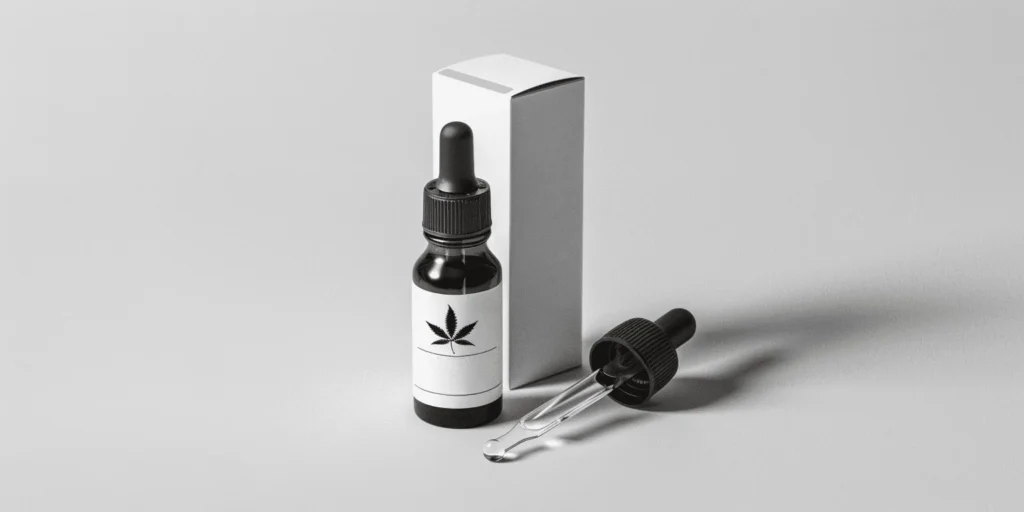
Reducing carbon footprint in distribution
Reducing the carbon footprint in distribution is a vital strategy for enhancing the sustainability of CBD production. At Hempo Solutions, we implement several key practices to achieve this goal. One of the primary methods is optimizing transportation routes to minimize travel distances and fuel consumption. By carefully planning and streamlining our delivery paths, we significantly reduce greenhouse gas emissions associated with our logistics operations.
Collaborating with eco-friendly logistics providers who prioritize green practices further decreases our environmental impact. These providers often use electric or hybrid vehicles and efficient delivery scheduling to minimize emissions.
As consumers become more environmentally conscious, they increasingly prefer brands committed to eco-friendly practices. By choosing Hempo Solutions as a CBD supplier, you also contribute to sustainable CBD production.
Efficient transportation strategies
Efficient transportation strategies are crucial for reducing the carbon footprint in sustainable CBD production. These strategies involve using advanced logistics software to plan the most efficient delivery paths, reducing unnecessary travel distances and the time vehicles spend on the road.
Partnering with eco-friendly logistics providers is another key component of our strategy. These providers employ green practices such as using electric or hybrid vehicles, which emit fewer pollutants compared to traditional gasoline or diesel-powered vehicles. Moreover, they implement efficient delivery scheduling, which reduces the number of trips needed and ensures that deliveries are consolidated whenever possible.
By reducing our carbon footprint through optimized distribution and eco-friendly logistics partnerships, we can strengthen our commitment to sustainable CBD production. This dedication to green logistics enhances our reputation and appeals to eco-conscious clients positioning us as a leader in the sustainable CBD industry.
Final thoughts on sustainable CBD production
Sustainable CBD production encompasses several key practices, all of which Hempo Solutions implement to ensure environmentally responsible and high-quality CBD products.
We prioritize organic and pesticide-free cultivation methods, selecting EU-approved farms that focus on soil health and ecosystem balance. By utilizing green CBD extraction methods like CO2 extraction, we avoid harmful chemicals and reduce environmental impact. These methods ensure high purity and potency in our CBD products while maintaining a low carbon footprint.
Our packaging strategy includes the use of biodegradable plastics, recyclable materials, and glass. Minimalist packaging designs reduce material use and waste. By optimizing distribution routes and partnering with eco-friendly logistics providers, we significantly lower our carbon emissions.
Hempo Solutions is committed to setting high standards for sustainable CBD production and inspiring others to follow. Together, we can make a significant impact on the environment and create a healthier future for all.
Featured Articles

Blog Home
No Content
